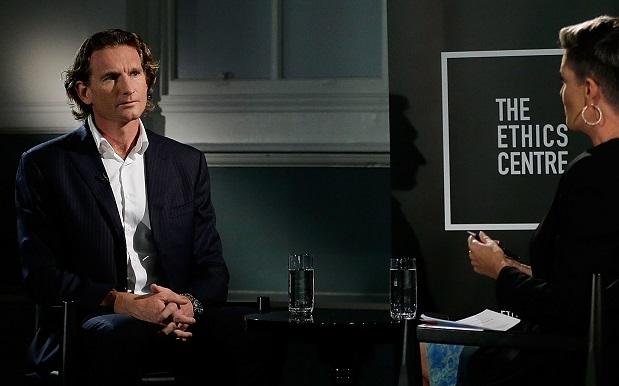
As Essendon Football Club work their way through the massive ramifications of 34 suspensions handed out to past and present players accused of doping, former coach James Hird was given the opportunity to defend his regime – and the players he oversaw – in an interview last night.
At The Ethics Centre in Sydney, Hird told the ABC’s Tracey Holmes that his former players still deserved the benefit of the doubt over the contents of injections at the centre of the scandal.
James Hird on the 2012 sport #dopingscandal at @EssendonFC
Watch live https://t.co/pBca6TgJUF pic.twitter.com/68XiyEMRx5
— ABC News 24 (@ABCNews24) January 17, 2016
Although he admitted he had “a level of responsibility in that” and he “should have done more when the opportunity came,” the level of scrutiny placed on Hird has been drawn into question.
Commenters thought the interview could’ve done a lot more, though:
#hirdinterview
1 #Hird answered questions asked but
2 @TraceyLeeHolmes questions 2 soft, no follow up
3 #Hird keeps defending #Danks why?
— David Savage AM (@DavidSavage63) January 18, 2016
So Tracy Homes reckons that #Hird wasn’t to be absolved in the #EssendonSaga . Highly doubt that’s going to happen #hirdinterview
— Lisa Rafferty (@Leesidge) January 17, 2016
#hird disappointed @TraceyLeeHolmes left critical Qs unasked hird ideluded doesnt understand #wada code has crushed my interest in #afl
— MJ (@MJ4Equality) January 17, 2016
“Surely it must have occurred to someone, somewhere in Essendon to ask for detailed information to be provided.
And if the answer was not forthcoming, then surely those in authority should have put a hold to the supplements program until there could be absolute certainty that what was being injected was perfectly safe and compliant.
Or perhaps the ambiguity was deliberate – a matter of ‘plausible deniability’ – and something that responded to the human inclination not to know unpleasant truths.”
While Dr Longstaff said he believed all parties involved in the saga were acting “in the sincere belief that they were doing what was best for the institution they were committed to protecting,” he also leveled claims of personal responsibility against Hird and the players that were largely absent in last night’s interview.
“At the heart of the [Court Of Arbitration For Sports] findings is a ruling that players are personally responsible for what is done to and with their bodies.
This is a responsibility that cannot be ‘outsourced’ to any other person – no matter what they might claim and no matter how sincere a friend they might be.”
As it stands, the suspended players are exploring available opportunities to overturn their bans.



